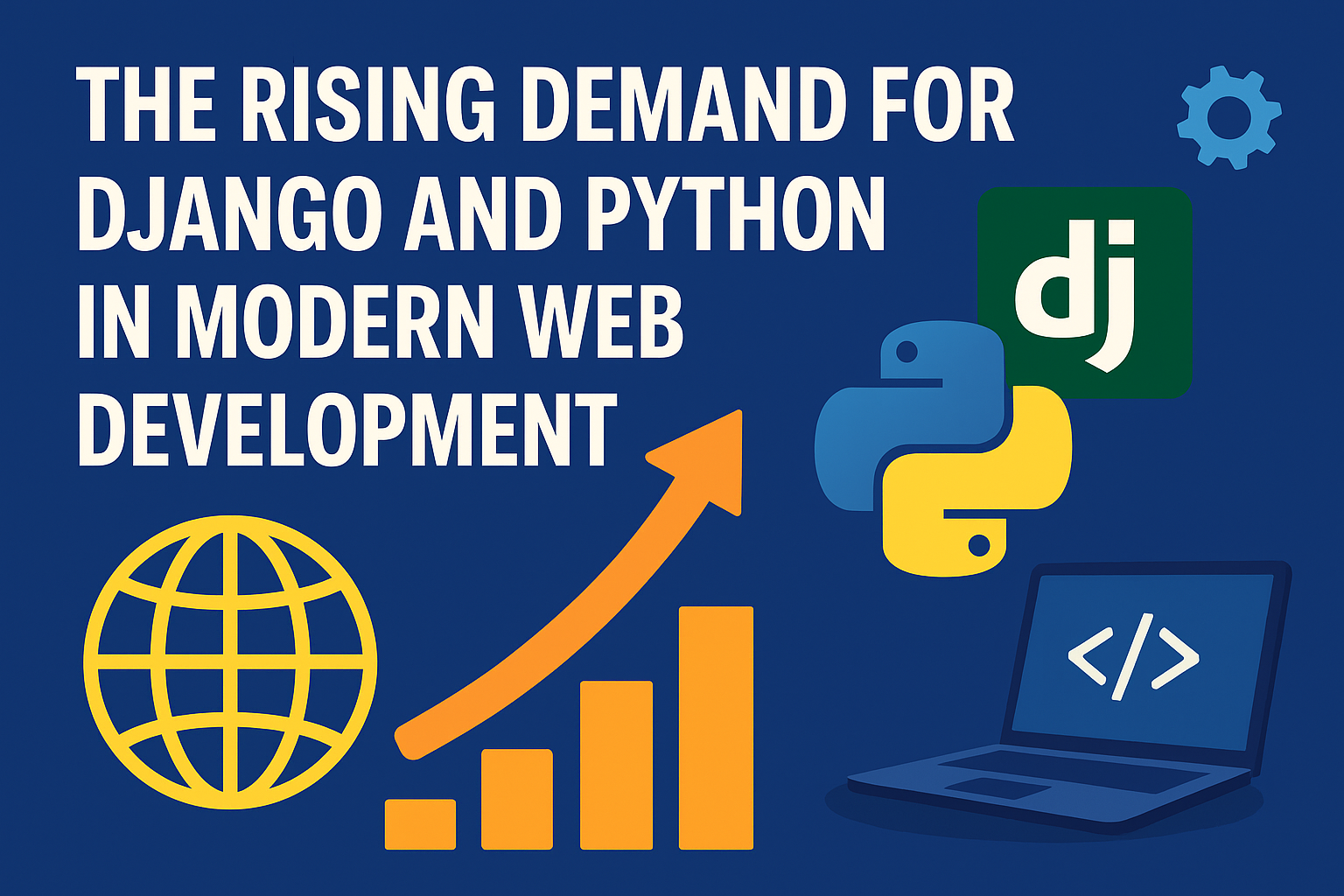The Rising Demand for Django and Python in Modern Web Development
Aronyo Mojumder | Oct. 24, 2025 | 0 Comments
The Rising Demand for Django and Python in Modern Web Development
In the world of technology, few programming languages have managed to achieve the same level of influence as Python. From data science to web development, automation, AI, and machine learning — Python has become the universal language of innovation.
But when it comes to web development, one framework has truly stood out — Django. Built on Python, Django helps developers build fast, secure, and scalable web applications. Over the years, it has become one of the most trusted frameworks among startups, tech companies, and even large enterprises.
In this article, let’s dive deep into why Python and Django are in such high demand and how they are shaping the future of web development.
Why Python Continues to Dominate the Developer World
Python is not just a programming language — it’s an ecosystem. Its simplicity, readability, and huge collection of libraries make it ideal for both beginners and professionals.
Here’s why companies love Python:
- Easy to Learn and Use
- Python’s syntax feels close to natural English, which makes it beginner-friendly. Developers can quickly learn the basics and start building projects in no time.
- Versatility Across Domains
- Python is used in almost every tech field today:
- Web Development—Using frameworks like Django and Flask.
- Data Science & Machine Learning – With Pandas, NumPy, TensorFlow, and PyTorch.
- Automation – For simplifying repetitive tasks.
- Cybersecurity, IoT, and Cloud – Python powers many advanced technologies.
- Strong Community Support
- With millions of active users, Python has one of the most vibrant developer communities. You can find help, libraries, and tutorials for almost any problem.
- Great Career Opportunities
- Python consistently ranks among the top 3 most in-demand programming languages globally, according to Stack Overflow and GitHub surveys.
Django: The Framework That Supercharges Python
If Python is the engine, Django is the vehicle that gets you to your destination faster. Django follows the “Don’t Repeat Yourself (DRY)” principle—meaning it helps developers write clean, efficient, and reusable code.
Key Features of Django
- Batteries-Included Philosophy
- Django comes with built-in features like authentication, admin dashboard, form handling, URL routing, ORM (database management), and more. You don’t need to install 10 separate packages to start a project — Django gives it all by default.
- Security First
- Django automatically protects against common web vulnerabilities such as SQL injection, XSS, and CSRF attacks. This makes it a trusted choice for secure applications.
- Scalable and Reliable
- Django’s architecture allows it to handle high traffic loads. Major websites like Instagram, Spotify, Mozilla, and Pinterest run on Django.
- Rapid Development
- With Django, you can go from idea to deployment in weeks instead of months. It’s perfect for startups that need to launch quickly.
- Excellent Documentation
- Django’s documentation is one of the best among open-source frameworks. Even new developers can follow it and build complex applications easily.
Career Opportunities and Job Demand
Let’s talk numbers — the demand for Django and Python developers is stronger than ever.
- According to Indeed, Python ranks among the top 5 most requested skills in software development jobs.
- On LinkedIn, there are thousands of open positions for Django developers, especially in roles like:
- Web Developer
- Backend Engineer
- Full Stack Developer
- Software Engineer
- Average salaries for Django developers are impressive too — often above $80,000/year globally, and even higher in tech hubs like the US, UK, and Singapore.
In South Asia (including Bangladesh and India), Django developers are also in strong demand for freelance and remote work, especially through platforms like Upwork, Fiverr, and Toptal.
Django’s Role in the Future of Web Development
As the world shifts toward cloud-based and AI-powered solutions, developers are looking for frameworks that are fast, secure, and flexible. Django perfectly fits this requirement.
Here’s how Django is staying future-ready:
- Integration with AI & ML
- Since Django is Python-based, it easily integrates with machine learning models — enabling intelligent web applications.
- API Development Made Easy
- With Django REST Framework (DRF), building APIs for mobile apps or React frontends becomes straightforward.
- Scalability for Big Projects
- Django is not just for small websites. It powers large-scale systems, SaaS platforms, and enterprise-level products.
- Open Source and Constantly Evolving
- Django is continuously updated and improved by its global developer community — ensuring it stays modern and reliable.
The Future Looks Bright
In the coming years, the demand for Python and Django developers will continue to grow. With increasing reliance on web platforms, cloud computing, and automation, companies need frameworks that balance speed, security, and scalability — exactly what Django provides.
If you’re learning development, Django is an excellent place to start. It teaches you how real-world applications are built — from models and views to databases and APIs.
Final Thoughts
Python and Django have transformed the way we build and deploy web applications. They are not just technologies — they represent a mindset of productivity, simplicity, and innovation.
Whether you’re a student, freelancer, or aspiring software engineer, mastering Django can open doors to exciting opportunities across the world.
So, if you haven’t started yet — now is the best time to learn Django and become part of the global Python revolution!
Leave a Comment
Comments
No comments yet.
Categories
- All 1
- Web Development 1
- AI & Machine Learning 0
- Cybersecurity 0
- Data Science 0
- Blockchain 0
- Cloud Computing 0
- Others 0
